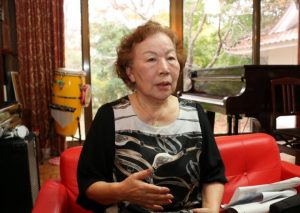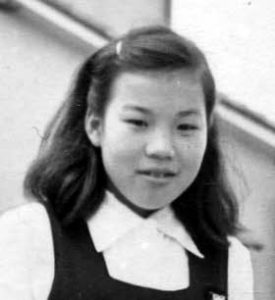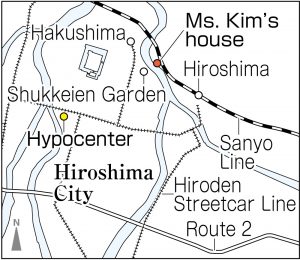Survivors’ Stories: Kim Hwaja, 84, Kure City—Having suffered from “double hardship”
Dec. 10, 2024
Passing on experience of A-bombing as Korean A-bomb survivor living in Japan
by Kana Kobayashi, Staff Writer
That day, in Hiroshima where the atomic bomb was dropped, there were many people with roots on the Korean Peninsula. Among them was Kim Hwaja, now 84 years old. She has lived with the double hardship of being both an A-bomb survivor and a Korean resident in Japan.
The Korean Peninsula was once under Japanese colonial rule. Many residents struggling with their daily lives came to Japan in search of a means of living or were conscripted into the military. Ms. Kim was born in Osaka to parents from Busan and moved to Hiroshima when she was about two years old.
On August 6, 1945, around when she woke up in her home in Osuga-cho, near Hiroshima Station, she “saw a flash of light, and then it went pitch black.” She was enveloped by a flash of light and the ensuing darkness. Though she was only four years old, her memory remains vivid.
At the time, her family consisted of five members: her parents, her younger sister, and her younger brother. Her father, who worked for the army, had already gone to work. She remembered her mother taking her in a horse-drawn carriage to the Ushita area (now part of Higashi Ward). Covered with a futon, she peeked through a gap and could see the central area, where buildings were “messy” in ruins and smoke was rising.
Her family was safe, but her relief was short-lived. Perhaps due to the effects of radiation, her hair fell out. She suffered from severe headaches and dizziness, and her entry into elementary school was delayed by a year. Unable to participate in physical education classes, she would watch her classmates from the classroom.
From the 6th grade to junior high school, a car would pick her up from school and take her to the U.S. research institute Atomic Bomb Casualty Commission (ABCC, now the Radiation Effects Research Foundation) on Hijiyama Hill (now part of Minami Ward), where she underwent physical examinations.
Adults around her whispered things like, “You’re a human guinea pig,” and “Don’t tell anyone you’re exposed to the A-bombing, or you’ll never get married.” Classmates said to her, “She’ll give us her A-bomb disease.” She also faced discrimination as a Korean resident in Japan, with people telling her those of a different race should leave Japan. The emotional trauma from the hurtful words of her elementary school classmates remains painful to this day.
When she was 20 years old, she married another Korean A-bomb survivor living in Japan and had seven children. However, she only began sharing her memories of that day in detail with her family a few years ago. This change came after her great-grandchild entered Noborimachi Elementary School in Naka Ward, the same school Sadako Sasaki attended. Sadako died of leukemia ten years after the A-bombing. Ms. Kim had visited Sadako in the hospital during her own time at Noborimachi Junior High School and folded paper cranes with her. Reflecting on the memories, she felt a responsibility to pass on the story of young lives that were ruthlessly taken.
Last year, the South Korean president’s visit to Hiroshima in conjunction with the summit meeting of the G7 (Group of Seven industrialized nations) was also a turning point. Ms. Kim said, “I want to convey the ‘double hardship’ endured by Korean A-bomb survivors living in Japan.” For many years, she had been known by her Japanese first name, Hanako, as the Korean residents living in Japan were compelled to use Japanese names under the “Soshi kaimei” policy imposed by the Japanese government. However, she began sharing her accounts using the Korean pronunciation of her name, Hwaja.
On December 10, the Nobel Peace Prize is awarded to the Japan Confederation of A- and H-Bombs Sufferers Organizations (Nihon Hidankyo) in Norway. Ms. Kim emphasized, “Behind this award are many A-bomb survivors of different nationalities, ages, and life stories.” She added, “War and nuclear weapons continue to cast a shadow over each person’s life. We must not let this award be merely about winning the prize. Instead, we must use it to lead to actions to eliminate war and nuclear weapons.”
(Originally published on December 10, 2024)










